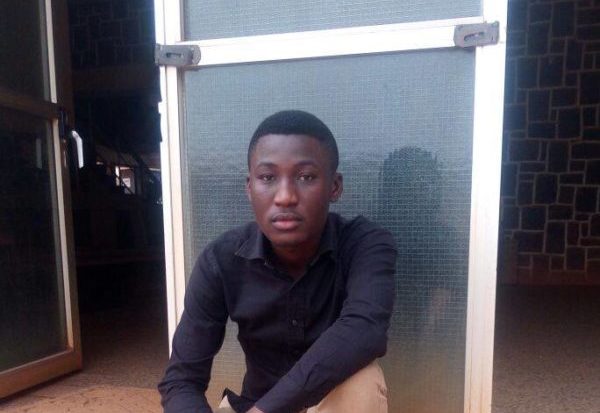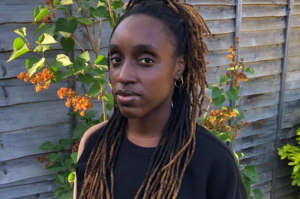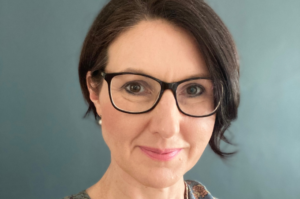
Arinze Ifeakandu is the first writer published by Brittle Paper before his shortlisting to be recognized by the Caine Prize. We published his nonfiction, “New City,” an exploration of the city of Kano, and his memoir, “What It Means to Feel Adrift,” a meditation on, well, what it means to feel adrift. We further published his interview with Chimamanda Ngozi Adichie, which, as its editor, he conducted for his university journal, The Muse, which we republished online. A 2013 alumnus of the Farafina Creative Writing Workshop, he was a finalist for the 2015 BN Poetry Award. His shortlisted story—which won him an Emerging Writer Fellowship from A Public Space in 2015—was named in our list of “The 31 Best Pieces of 2016.” At 22, he is the Caine Prize’s second youngest ever shortlistee. But even more striking is that the story was written in 2013, in his second year in university when he was only 19.
This interview took place via email between Ebenezer Agu in the market city of Onitsha, Southeastern Nigeria and Arinze in the Northern Nigerian metropolis of Kano. Here, they discuss the dynamics of gay love in fiction, labels, family, emotional fragility, James Baldwin, Albert Camus, and the records Arinze’s shortlisting just set.
*
Interviewer
Hello, Arinze. How have you been, and how do you feel about making the Caine shortlist?
Arinze Ifeakandu
I have been fine, thank you. I feel pretty excited. It’s one of those things you hope will happen to you, and when it does you realize you really never believed that it would, and you are at a loss how to deal with it.
Interviewer
Thinking back to when you were writing ‘God’s Children Are Little Broken Things,’ what could best describe that period was ‘frantic.’ The way you were always on your computer: at the department, the hostel, in Christ Church Chapel choir room, as if the story was seeping through your fingers and you needed a container for it. What about ‘God’s Children’ required such urgency?
Arinze Ifeakandu
I really cannot pinpoint what in the story required such urgency, but I can say that writing it, I felt possessed. I think everything I had written in my life, beginning from the juvenilia novels I scribbled in secondary school to my early attempts at short stories—I think everything was pointing towards ‘God’s Children,’ everything found residence in ‘God’s Children.’ I knew the characters well, and I knew the places they inhabited. I knew, understood, the point they were in their lives, what it meant to be at that point in one’s life. It was only a matter of the right time, and—I don’t often have this romantic view of my writing—when the story came, complete, I just couldn’t stop putting it down.
Interviewer
I would not say that ‘God’s Children’ is personal, because of the way that word is easily misunderstood as autobiographical, but it does move with immediacy and so effortlessly achieves empathy. The story bears clarity in its structure. The way the places—Kano and Nsukka—are given attitudes. The characters and the relationships that exist among them are fascinating; Lotanna wielding heavy significance, with Kamsi no less significant himself. Even little Chisom, I can’t forget how cute he is. You wrote every part of the story like you were describing a part of your body that you knew so well.
Arinze Ifeakandu
By the time I started writing the story, I had walked around with the story in me for so long that I even knew what a character could or could not say. It would really please me to say that I was cold and analytical and knew all the right strings to pull—there was perhaps some of that—but much of it came from a raw place, a bleeding, sometimes seething place. I remember, one night, I woke up to a text message from my brother, and I felt really sad and, because it was rather late to call home, I sat down and began writing. And it was raw and heartfelt. I would also not say that it was a personal story, because, like you said, there is a very thin line between people’s perceptions of the personal and the autobiographical, but I had watched people enough to become troubled by the feeling that arose in me that humans are self-sabotaging, that we stretch forth our own hands and swipe at joy, at personal and collective joy. In exploring this feeling, it was easy to reach out, from time to time, for the familiar.
Interviewer
I love the relationship between Lotanna and Kamsi because it is self-assured. Speaking within convention, from outside the reality of the story, it is a gay relationship. When it first came out in A Public Space magazine, I gave it to my neighbor to read and, not long into the story, he spoke about it as a ‘gay’ story. I was disappointed at most of the things he said, and I asked him how he couldn’t see the complexity of the lives there. There are only a few stories I’ve read which explore existential tragedy as much as ‘God’s Children’; for this reason I was sad about my neighbor’s stifling statement. Talking about this now, I remember a conversation I once had with a friend about labeling, how labeling could work for subjugation. This issue is quite difficult, though; for one thing, stories are multifaceted. What would you say about tagging ‘God’s Children’ a gay story?
Arinze Ifeakandu
I am suddenly reminded of the way people compartmentalize sex. ‘They had gay sex in that movie,’ people say, but never, ‘They had straight sex.’ And it feels to me like a censor tactic, a way of raising red flags. Sex is sex and love is love. The relationship between Lotanna and Kamsi could easily have been between a boy and a girl, no? The details of Lotanna’s journey into himself might have been different with a girl, but the essentials would be the same: a boy finds true love and it rocks his world, wrings him, hangs him out flailing and helpless. I wish people did not have need for little compartments in their lives, but people do, because these compartments make their lives easy. It’s like when you’re in your kitchen and you know exactly where the knives are, exactly where the pots are. You know that you always reach out for a certain brand of spices, and that you rarely reach out for another. It creates a situation where you never question your tastes, your suppositions. It also bothers me, you know, that the stories of those who are considered the norm do not come with these extra adjectives. That is not to say that I am all that bothered about the tag; I really don’t care, because if calling it a gay love story would make a lonely or confused gay teenager seek it out and find company in it, then the job is mostly done.
Interviewer
‘God’s Children’ raises both forgiveness and the right to anger. I keep wondering how Lotanna’s father could be so wicked to the mother only to become penitent after her death. Lotanna’s reaction, in not being forceful, makes a strong statement about how anger could be a right, and a justified reaction to certain behaviors. On a level, it feels as though Lotanna’s father has no right to even ask for forgiveness.
Arinze Ifeakandu
I feel, also, that he is asking forgiveness from the wrong person and at the wrong time. Would he even have asked for forgiveness had Lotanna not distanced himself from him? In writing that character I was curious because I have never understood people who become so self-absorbed to the extent that everyone they care about, should care about, suffers. Lotanna is a son, and the Igbo have a saying that anger for one’s brother does not reach the bone. I remember halting when writing the scene where he challenges his father, halting and wondering, just wondering if that encounter was possible within the context of his character, but I wrote it down anyway. Because there is a sense in which he is his father, and perhaps that realization pushes him towards deeper anger.
Interviewer
Speaking of patterns, Kelechi Njoku drew striking resemblances between ‘God’s Children’ and James Baldwin’s Giovanni’s Room in his review of your story. What strikes me is how ‘God’s Children’ illustrates Albert Camus’ inquiry into absurdity, suicide, and hope in The Myth of Sisyphus. There is a question on Lotanna’s mind after the mother dies: whether God cares. He begins to wonder about a thought in Camus; whether the world and, invariably, the things beyond it are irreducible to us. Such a moment in Lotanna’s life, with a flash of the ‘denseness’ and ‘strangeness’ of God, is among the absurd. Lotanna is the character who’s shown off as suffering, the one that is expected to explode, but, quoting Camus, “In a man’s attachment to life there is something stronger than all the ills in the world. The body’s judgment is as good as the mind’s and the body shrinks from annihilation.” Kamsi is rather the ‘undermined’ character. This reflects in his habit of saying the Serenity Prayer but is so shaded that after his death, Lotanna could rightly ask “Why?” I think of Kamsi’s fate as suicidal, not because it is stated in the story but because the questions of why and endurance in Lotanna at the suggests self-annihilation for Kamsi. Then there is that trace of vagueness that makes suicide unverifiable, which can be trailed to Kamsi. Whatever it is that happens to him, one thing is sure: he acts in line to a typical tragic character: he does what is necessary, what needs to be done in a given condition. What do you think?
Arinze Ifeakandu
After Kelechi’s review, I got and started reading Giovanni’s Room, and one of the things that struck me most was the way everything that happens seems inevitable, how choice feels like a notion. There are many things that David could have done differently, choices he could have made. But we are making these judgments as spectators, you know, the way everybody becomes an expert when watching football. We see with more clarity, and yet in our living as humans our eyes are suddenly shielded, and we no longer have control of the variables. I am not a fatalist: But it is difficult to shake off the feeling that no matter what path we choose, it is only a matter of time before we are faced with that thing which is already there. Our parents fall sick and die; someone decides that we deserve to be lynched for who we love; we grow old. These are things we have no control over. You are right to perceive Kamsi’s being as suicidal, because he seems so organized and yet so adrift, unhinged. The story does not delve deeply into his consciousness, but I get a feeling that he sees with more clarity than Lotanna, that he resigns himself to what he sees to be ‘the way of the world’—I am thinking of the Serenity Prayer—but his fragility portends tragedy, because to be so emotionally fragile and yet so aware of one’s sources of pain: That can only lead to despair.
Interviewer
Your shortlisting is remarkable for more than only your story. At 22, you are the second youngest ever to make the shortlist, after Zambia’s Efemia Chela did so at 21 in 2014. But you are the youngest ever Nigerian shortlistee—Adichie used to be the youngest from her shortlisting in 2002 at 25. On a third, smaller level, you are the third writer from the University of Nigeria, Nsukka to make the shortlist. How do all these feel?
Arinze Ifeakandu
I didn’t know, until now, that I am the youngest Nigerian or even the second youngest ever to be shortlisted. I still cannot gather how it feels for me. I don’t feel very young, though. My brother said, when he visited me in Nsukka, that my friends and I talk like old men. The University of Nigeria, Nsukka has a vibrant arts community. I don’t know how it was when Adichie and Unigwe were there, but in my four years in Nsukka, I often had this strong feeling to drag every Nigerian there, to show to everybody what the students were doing. And I’m not just talking literature; in music and fine arts and in theatre arts. It’s crazy, good crazy.
Interviewer
How does your mind work? Since ever knowing you, I haven’t been able to figure it out; it makes me wonder.
Arinze Ifeakandu
I’ve been wondering about this myself. And not in a good way!
Interviewer
Thank you so much, Arinze.
Arinze Ifeakandu
You’re most welcome.
*
Read a review of Arinze Ifeakandu’s “God’s Children Are Little Broken Things” by 2017 Commonwealth Prize shortlistee Kelechi Njoku.
Read the story HERE.









Caine Prize Shortlisted Stories Review – idlewritersblog August 01, 2017 10:31
[…] Q&A panel at SOAS university so my collection of quotes obtained first-hand is minimal. Click here, here or here to read more about what inspired this […]